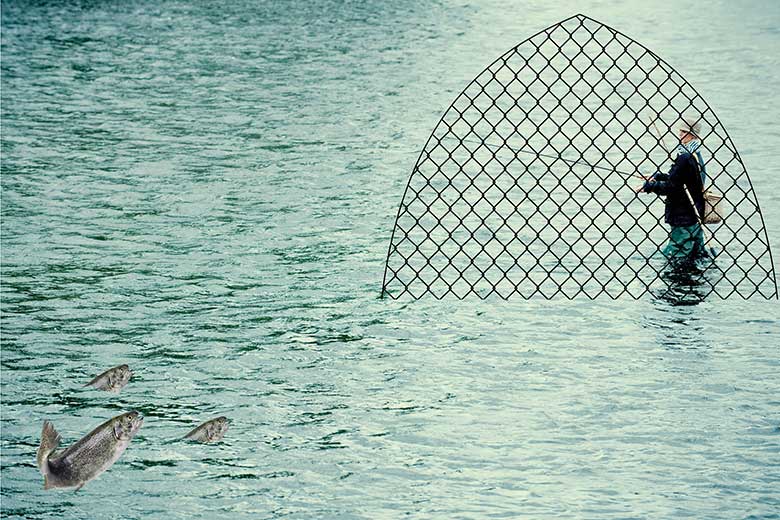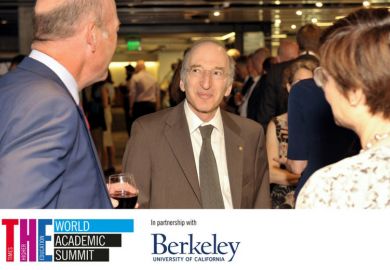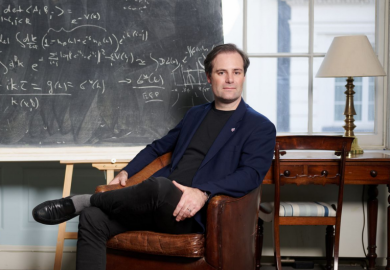"The whole reason to do cosmology is because anything you do in cosmology is mind-boggling. You have to get a kick out of the idea that you’re going to be asking questions about something that the brain is just not very well designed to handle.”
Saul Perlmutter, professor of physics at the University of California, Berkeley, knows better than almost anybody else what it takes to make world-shattering discoveries. In 2011, he shared the Nobel Prize in Physics with Brian Schmidt and Adam Reiss for his role in the discovery that cosmologists had been completely wrong about what is happening to the universe.
In 1929, Edwin Hubble, the American astronomer, observed that the universe is expanding, with galaxies shooting away from each other like dots on the surface of an inflating balloon. It was assumed that this expansion was slowing, and that the gravitational attraction of everything in the universe would eventually pull it back in on itself. Perlmutter and his team set out to study the rate at which the expansion was slowing.
He was searching for a type of supernova caused by the mass of a star reaching a limit (known as the Chandrasekhar limit) and collapsing in an intense burst of light. Given that these supernovae all occur in the same way, they have a uniform brightness and can be used as a standard for measuring astronomical distances.
Perlmutter initially estimated that it would take three years for his team to measure how quickly the distant supernovae were retreating, and come to their conclusions. However, after three years they had not identified a single supernova. It took 10 years to complete the project and the team’s eventual conclusion was entirely unexpected: the expansion of the universe is not slowing down at all but speeding up.
“It was not a simple matter of saying that we were going to make a discovery and then we made it,” he told Times Higher Education’s World Academic Summit at the University of California, Berkeley, last September. Nor was there any tangible benefit to humanity in learning how the universe was expanding; after all, by the time it began collapsing in on itself, the assumption was that the Earth would long since have been engulfed by the explosion of its own sun.
That last point is particularly pertinent given the election of Donald Trump as US president a few weeks after Perlmutter spoke. Many US scientists fear that the billionaire businessman and professed climate change sceptic may follow the example of other fiscal conservatives such as former Canadian prime minister Stephen Harper, who, before his election defeat in 2015, fought a running battle with his country’s blue-skies scientists over his funding emphasis on short-term impact and serving industrial interests.
Indeed, there is already a growing perception among scientists in many countries that it is becoming harder to secure funding for fundamental research.
“In the modern-day context, there is a tendency to say: ‘What is it that you plan to research? When will you finish it, and what day will your discovery be made?’” Perlmutter says.
While he accepts that there is a place for goal-focused research, such as urgently responding to the effects of climate change or relieving hunger, he also thinks that it is important to include basic research in a “healthy mix” of science funding. In his view, large-scale, ambitious projects to explore fundamental science tend to be constrained by a goal-focused approach to funding.
“I don’t think [that our] particular project would have happened in today’s funding environment,” he says. “I think [that it] would have been very difficult [to justify] in a world in which you’re managing every last cent and making sure that you don’t waste any money. Now, excuse me, you can be very good at not wasting any money and also very good at not making any discoveries.”
The technical difficulties that Perlmutter’s team faced in hunting distant, exploding stars led them to develop new technologies. For instance, the challenge of detecting red light led to the development of sensors that were sensitive to blue as well as red light; these are now widely used in medical imaging, including in devices used to diagnose heart disease.
“You can’t order [such technological breakthroughs] up; you have to let people try out ideas. When you focus really smart people on exciting problems they invent all sorts of things,” Perlmutter says.
When working on his theory of general relativity at the Humboldt University of Berlin, he continues, Einstein appeared to be just playing with mathematics. Although general relativity has transformed how we understand space, time and most of the rest of physics, it took many years until the full impact of his work became apparent.
“[General relativity] is not something that you would be taking on as a job if you were trying to make sure that...your corporation would make more money next year,” Perlmutter says. “However, the modern-day world has billions of dollars of industry and so much of how we run [our lives is] based on the fact that we now know how to do GPS location, which depends on using corrections that we can only get from Einstein’s theory of general relativity. We need to be able to tell that story to those who are trying to be very practical in their funding.”

Perlmutter is currently working on the SuperNova/Acceleration Probe (SNAP) mission to search for supernovae at their brightest. This is proposed to form part of the Joint Dark Energy Mission: a programme co-funded by Nasa and the US Department of Energy to study the so-called dark energy believed to be responsible for the universe’s accelerating expansion. Despite Mr Trump’s reported interest in exploring Jupiter’s moon Europa, widely thought to be the most likely location of extraterrestrial life, there are likely to be grave doubts about whether his appetite for wonder will extend to searching for a theoretical substance about which nothing is known. But Perlmutter maintains that even when your motivations are distinctly worldly, investing in basic science makes perfect sense.
“Even if you’re a hard-line business person and you say that the only thing we’re worrying about is developing our bottom line for next year, you can look at the example of venture capitalists,” he says. “You can ask: ‘What fraction of the money they invest do they assume is going to end up [funding] a successful project?’ And it’s a small fraction, as I understand it. You’re looking for those rare special events and you have to spread the resources to get them.”
Perlmutter credits much of his inspiration to the vibrancy of the academic environment at Berkeley. Unlike many other high-profile scientists, who consider it a distraction, he still enjoys lecturing.
“Teaching really awakens a lot of the ideas that you otherwise wouldn’t get a chance to think about,” he says. “You want there to be places where people are thinking about the future, thinking about different ways of approaching problems, but I don’t think that works well in a hidden, isolated environment. I think there’s something about the engagement, day to day, with the graduate students and the undergraduate students that makes the story much more connected to the world, and also energises the story because the [students] are often the ones that bring you that sense of the energy of the new ideas that are coming in from the culture around us, and occasionally new ideas even for your field. So I think that mix is important for us.”
Students also benefit from spending time with academics who are not just passing on received wisdom, Perlmutter continues, but continually shaping understanding of their field. “I think for students it’s never too early...to realise that they should be helping...to figure out the world together, not just learning the received facts and the things we already know,” he says. “We find ourselves looking at a world where I don’t think almost any of the problems I see today would worry me, if we knew how to work together and how to think through problems together in a rational way that wove together fears and needs with a rational understanding of the world...Maybe one of the best ways into that is to start teaching.”
With this in mind, Perlmutter has recently started running a critical thinking course at Berkeley. In an age of post-truth politics, he believes that it is more necessary than ever to scrutinise evidence and apply healthy scepticism in all decision-making. His new course, called Sense and Sensibility and Science, includes contributions from his Berkeley colleagues John Campbell, a philosopher, and Tania Lombrozo, a social psychologist.
“The course has been asking what can we teach the next generation that will help them [apply] this scientific-style critical thinking: that will allow them to work together, taking into account all the needs, fears, goals, desires and yet being able to weave into that all the truth-tracking and the reality-tracking that we’ve learned, as scientists, [can help] us tell when we’re fooling ourselves.”
Not that scientists are, by any means, unimaginative, fact-obsessed killjoys; Perlmutter returns to his central point about the “fundamental misunderstanding” about how the big breakthroughs tend to come about.
“What you’re looking for is gigantic surprises and transformations that allow us to do things that we never thought were possible,” he says. “The only thing we know of that seems to work is to create an environment in which people are thoughtful, they’re playful and they’re trying many ideas. I think we have to learn how to tell that story, and how to teach it again.”
POSTSCRIPT:
Print headline: 'You can't order up a breakthrough'
Register to continue
Why register?
- Registration is free and only takes a moment
- Once registered, you can read 3 articles a month
- Sign up for our newsletter
Subscribe
Or subscribe for unlimited access to:
- Unlimited access to news, views, insights & reviews
- Digital editions
- Digital access to THE’s university and college rankings analysis
Already registered or a current subscriber?





